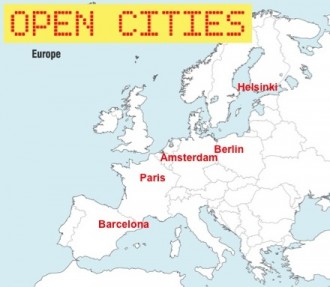Cities across Europe opening their data
Culture and transport are the first applications using public open data resources.
 The first Open Knowledge Festival in September 2012 attracted one thousand open data enthusiasts to Helsinki, Finland. Many of them used a priceless assistant while navigating in an unfamiliar city. Already in 2009, Helsinki Region Transport launched an open interface to public transport timetable and route data. Nowadays the data is used in dozens of handy smartphone applications, allowing travellers to locate themselves and find the right bus to their destination.
The first Open Knowledge Festival in September 2012 attracted one thousand open data enthusiasts to Helsinki, Finland. Many of them used a priceless assistant while navigating in an unfamiliar city. Already in 2009, Helsinki Region Transport launched an open interface to public transport timetable and route data. Nowadays the data is used in dozens of handy smartphone applications, allowing travellers to locate themselves and find the right bus to their destination.
Now the same is happening in Berlin, as the first German city.
“Berlin’s public transport companies are opening their data, step by step”, says Nadine Barthel, Open Cities project coordinator in Berlin.
There has been a huge interest in the Germany’s first public transport open data initiative. Already the first Apps & the City -hackathon in November 2012 attracted 150 developers and interested citizens.
Apps for moving around
In 2012 EU’s Open Cities project organized OpenCities App Challenge competition. It called for innovative products or services that use open data and solve a real problem in citizens’ everyday urban lives. The competition featured 113 competitors around the Europe. Majority of the apps were transport-related: booking a taxi, bike sharing, city travel guides.
The winner, Blindsquare, is a great example of the open data -based innovation. Blindsquare app provides visually impaired people new ways to get information on their surroundings. iPad and iPhone application combines GPS location information, speech synthesis and information from open data sources: FourSquare, Open Street Maps and open databases of the cities. It can tell a blind person the address of current location, where the nearest street crossing is, and shops and services found in a neighbourhood.
Location based open data applications are published across Europe. In Amsterdam, the ParkShark app helps to find the nearest parking meters. ParkSharp also shows the power of open source, says Gijs van Rijn, Open Cities coordinator from Amsterdam.
“ParkShark developers decided to open source this ‘parking intellingence’ as an API. Now the whole developer community can build new applications on top of it.”
Demand for cultural data
Amsterdam’s most inspiring open data set is the collection of the Rijksmuseum. Developers have an automatic access to the metadata and high quality images of the basic collection, which consists of over 111,000 objects.
Paris is known from numerous of movies, from ‘Amelie’ to ‘Last Tango in Paris’.
A team of developers is currently working with CineMap -application, allowing users to navigate to shooting locations of their favourite films.
Jonathan Bartoli, Open Cities coordinator for Paris, says that local open data catalog opendata.paris.fr is the country’s largest. Catalog provides various data on Paris, from newspaper kiosk and condom vending machine locations to the Paris city library lending data.
At the same time, 1000 kilometers south from Paris, Open Cities Coordinator of Barcelona Albert Domingo is pleased with a recent data opening, published in Catalonian open data catalog Gencat. The Ministry of Culture now offers data of cultural events that take place throughout Catalonia.
” It is amazing to see the cultural agenda refreshed every day. It has a real impact on citizens. I am expecting great applications using the dataset.”
Developer groups grow rapidly
While cities data catalogs are growing, so are the data user communities. About 400 people attended to the 1st Open Data Day in Catalonia. In Paris, there are several developer communities. Developers meet at Paris Android User Group PAUG, Silicon Sentier association, or at non-profit organization Cap Digital, a business cluster for digital contents and services, with over 700 members and 5600 Facebook friends.
“Cap Digital spreads information on call for projects, open data events and competitions to developers”, said Jonathan Bartoli.
In Berlin and Helsinki, local Open Knowledge Foundation community organize many meet-ups. Finnish Open Data Ecosystem Facebook group is a good way to keep up to date in the Finnish open data -scene.
The most active community of app makers seems to be in Amsterdam – or ‘Appsterdam’ – as the network of over 1 500 developers call themselves.
“Goal for Appsterdam is to establish Amsterdam as the Hollywood for App-making”, said Gijs van Rijn.
Or as Mike Lee, founder of Appsterdam, puts it:
“If you want to make movies, go to Hollywood. If you want to make musicals, go to Broadway. If you want to make apps, go to Appsterdam.”

Leave a Reply